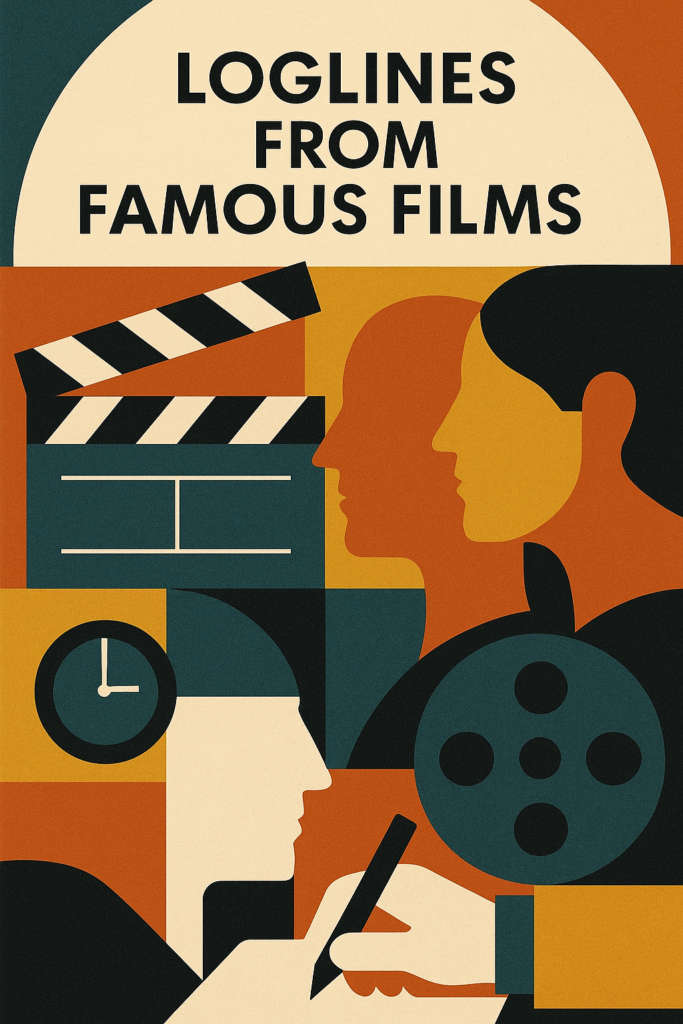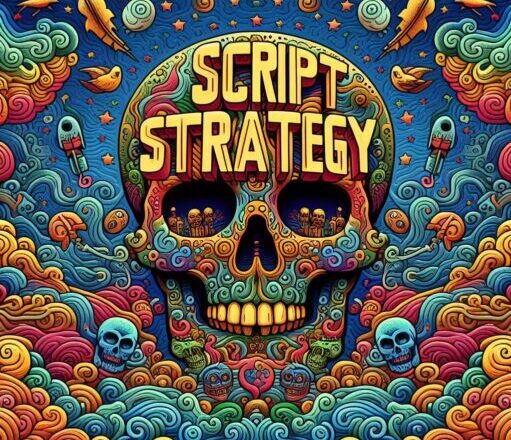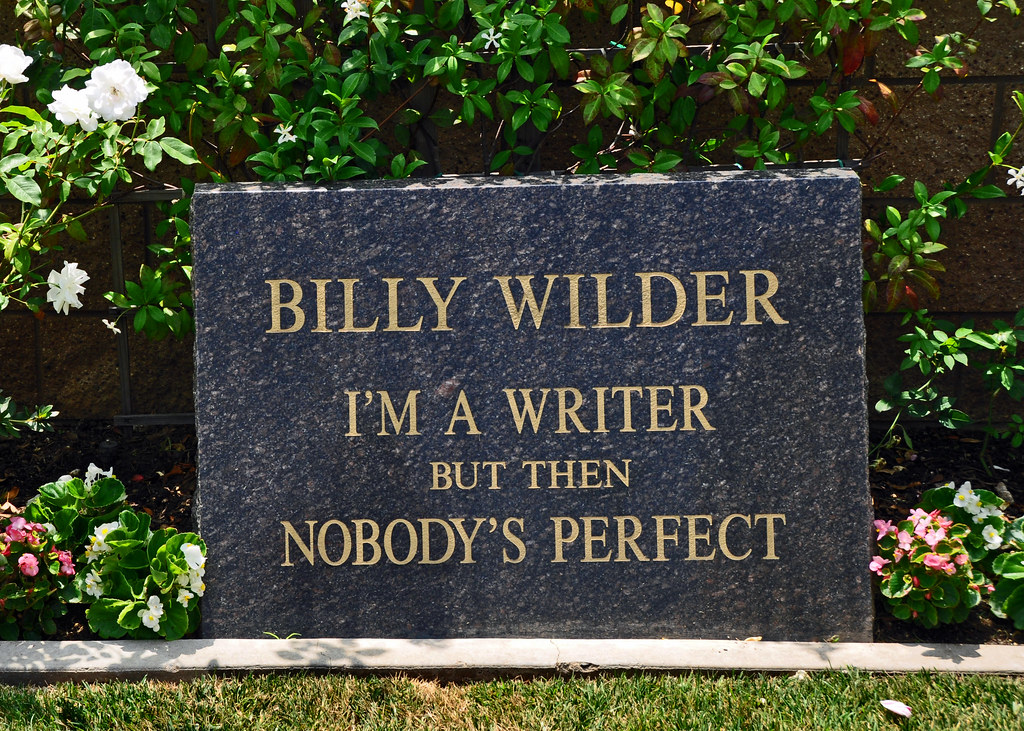Logline Examples from Famous Films: 10 Films in 25 Words or Less
NB: this post is co-written by ChatGPT, who evidently writes terrible loglines! Let’s give Chatty some feedback and commentary.

A Logline is NOT a Summary
First things first, Chatty wanted to call a logline a “summary” and, true to form, that’s what it provided.
Remember, the logline is an essential–but challenging–part of the screenwriting process. There’s a good argument to be made that there’s no point even embarking on a story unless you have a compelling logline down.
Now the point here is that it’s compelling. A fucking summary is not compelling.
The point of a logline is that it hooks the reader. The person wants to know more. If you don’t get a “tell me more”-type reaction from the person you’re telling the logline to, it’s all over.
There’s a whole art to writing a good logline, which comes with tons and tons of practice. Not least, the point is getting the most compelling parts of the film across in as few words as possible.
One thing Chatty got right is that a logline gives us the protagonist, her goal, and the stakes. Let’s critique Chatty’s work on ten films you already know (or really ought to if you don’t) and see what we can come up with.
A good logline needs to have Irony, Conflict, and Change. We’ll address this in more detail in a further post, but for the moment let’s do some basic critiques.
I’m going to write logline examples again for SEO.
1. Jaws (1975)
Chatty’s Logline: When a great white shark begins to terrorize a small beach town, a police chief teams up with a marine biologist and a grizzled fisherman to hunt it down.
Why this sucks: you’re telling me what happens, but I don’t care. Frankly, I don’t really give a shit about a shark terrorizing a small town, and I particularly don’t care who the team trying to fight the shark are.
If this is to appeal, it needs to be–in short–about Brody’s struggle. There needs to be a way in where we care about what Brody has to overcome if this shark is going to stop munching on skinny-dippers.
Rewrite: When an enormous shark terrorizes a tourist-driven beach community, police chief Brody must face town councillors insistent that the beaches stay open–and his own fear of water–to stop the beast.
Why it works: This logline introduces a compelling antagonist (a great big fucking shark), a clear protagonist (Brody), and the stakes (the safety of a town). We get the genre–thriller (and possibly horror), the high stakes, the contained setting, and–importantly–the specific hurdles Brody must overcome to get the job done.
Takeaway: Highlight action and stakes, but the human story is what makes them compelling.
2. The Godfather (1972)
Logline: The aging patriarch of an organized crime dynasty transfers control of his empire to his reluctant son.
Why this sucks: Are you for real? I mean I guess that’s the story but wow. It sounds remarkably lame. I so so so don’t care about this. Chatty apparently thinks that the word “reluctant” is enough for us to get an emotional grip on Michael’s situation.
Rewrite: The youngest son of an organized crime dynasty, intent upon “going straight,” must stand up for his family–and risk being drawn back into the mafia lifestyle–when his father is brutally attacked.
Takeaway: Figure out what emotional strings are being pulled for the protagonist and yank them. Hard.
3. The Matrix (1999)
Logline: A computer hacker learns that his reality is a simulation and joins a rebellion to free humanity.
Why this sucks: Again, it’s true yet utterly non-compelling. Telling the story means investment in the character. Chatty apparently thinks that the high-concept idea of the simulation is enough to draw people. (Maybe the sort of people who program Chatty. Just saying.)
We don’t get an explanation of what the fuck a “simulation” is or how humanity needing to be freed has anything to do with the story. A lot of this works because you already know the story, which is basically defining something using its definition. Alas…
That said, it’s off-mark but not all crap. It’s actually close enough that a couple of tweaks will do the job.
Rewrite: A hacker learns that reality as we know it is an illusion controlled by computers, only to find himself the only person who is able to liberate humanity from these machines.
Why it works: Also remember that we have to link the pieces together: humanity needs to be saved? From what? How does this have to do with the computer-based illusions?
A couple of extra words to link concepts will pay dividends.
Takeaway: High-concept ideas are excellent and welcome, but need to be explained clearly and without jargon (simulation).
Also I’m just going to say logline examples one more time and yeah, that’s all I’m doing.
4. Forrest Gump (1994)
Logline: A simple man with a low IQ inadvertently influences several major historical events in 20th-century America while pursuing his one true love.
Well, Chatty, stupid is as stupid does. In this case, you’re not doing yourself any favors.
Why this sucks: I am basically unoffendable, but even I bristled slightly at Chatty tossing off “low IQ” and “simple” in the same sentence. Again, it’s the story, but it’s not compelling.
Rewrite: An Alabama man with an IQ of 75 influences world-shaking events from the 1960s, 70s, and 80s, yet his true love, Jenny, consistently eludes him.
Why it works: The logline sets up a contradiction (a “simple man” affecting history) and a throughline (his love for Jenny). Note that the IQ thing can be dealt with more clinically, which makes it anyone’s judgment (e.g. “simple”) their own fucking problem, not yours.
The scope is epic, but the stakes become personal. It’s worth the extra word to put “Jenny” in there because we want to yearn for her the way Forrest does. Even the word “eludes” gives us emotional depth that “pursuing” doesn’t give.
Notice how little changes make such a difference with these things. Economy of words is really important!
As a note: Forrest Gump is the goddamn How Green Was My Valley of 1994. Pulp Fiction was robbed.
Takeaway: Juxtapose small personal goals with large-scale events to add uniqueness and heart.
5. Die Hard (1988)
Logline: A New York cop must save his wife and others taken hostage by terrorists during a Christmas party in a Los Angeles skyscraper.
Why this sucks: OK. Right. My big question here is why does a New York cop have a wife in Los Angeles? Isn’t there some sort of story here I should be aware of? Oh, there is! Why not put put that in the logline?!?!?!!?
FFS.
Rewrite: A New York cop, in LA to reconnect with his estranged wife, finds himself the only person who can help when German terrorists take over the skyscraper where she works.
Why it works: Yes, the skyscraper is important. It means “one location,” which industry people love. Particularly when that one building is the Sony building and Sony is the studio making your film.
In terms of the logline, though, remember that we need to understand there’s tension in the relationship between McClane and his wife. Otherwise it’s just too simple; remember, protagonists who are always good are always boring. Even in loglines.
This is a masterclass in the “one location, high stakes” structure. The protagonist, setting, antagonist, and goal are all laid out efficiently.
It’s worth the extra word to say “German” because Germans are always scary. And, paradoxically, Alan Rickman makes the best German terrorist.
Takeaway: Stating facts doesn’t give us a reason to care. We need emotional stakes as well. Damn you, Hans Gruber!
Hey, he just said logline examples because there’s no reason at all except forget it.
6. Titanic (1997)
Logline: A poor artist and an upper-class woman fall in love aboard the ill-fated Titanic.
Spoiler alert: the ship sinks!
I feel like this is a sort of culturally obvious enough that it doesn’t need to be stated, but then again, I don’t know what the TikTok generation knows or thinks so maybe we need to spell this shit out.
Rewrite: A penniless artist from stowage conducts an affair with a wealthy, engaged socialite during the Titanic’s ill-fated maiden voyage.
I’ll be honest: I didn’t do much here. I don’t know that Chatty even did that bad a job. Titanic is a dumb fucking melodrama and there isn’t much to the idea.
The value of the film is in the acting, the set-pieces, etc. rather than the story.
Why it works: There might be something interesting in the class of the two classes, and it’s worth mentioning that Billy Zane is going to fuck some shit up–hence “engaged.” Otherwise I’d give this one a soft PASS for Chatty.
Takeaway: If the value of the film is in its show-pony setting, then make sure that is stuffed in the logline.
7. The Silence of the Lambs (1991)
Logline: A young FBI trainee must confide in an imprisoned, manipulative killer to catch another serial killer on the loose.
Why this sucks: I’ll be honest–this one mostly gets the irony part correct. It is in fact ironic that Clarice must confide in one killer in order to understand another killer. What it’s really missing is Clarice’s internal conflict.
Rewrite: A young FBI trainee must enter the warped mind of an imprisoned psychiatrist with a taste for human flesh to profile–and catch–another serial killer before he skins his latest victim.
Why it works: The fact that Clarice must befriend Hannibal in order to catch Buffalo Bill is the heart of this story and it pulses with irony: cooperating with one vicious killer is necessary to stop the other one.
The major add here is how uniquely compelling Hannibal and Buffalo Bill are: Hannibal is a psychiatrist, which pretty obviously means he is manipulative (at least if he chooses to be), as well as a fucking cannibal. That’s a big thing to leave on the table, Chatty. For that matter, Buffalo Bill’s Woman Suit deserves a mention as well.
Throwing in some graphic WTF!?!? Details goes a long way in a good logline.
Takeaway: Keep irony at the core of your logline, but sprinkle in the shock value.
8. Back to the Future (1985)
Logline: A teenager is accidentally sent 30 years into the past in a time-traveling DeLorean, where he must ensure his parents fall in love or risk erasing his own existence.
Why this sucks: Honestly I think Chatty improved after writing a few of these. This is bland, but it’s not terrible.
The core feature of Back to the Future is that Marty sure as shit isn’t going back (to the future) unless he can get his parents to hook up. So, reverse engineering this: what is the worst thing that could possibly happen to someone who’s accidentally sent 30 years into the past? Well–disrupting his parents’ courtship (as such, if you haven’t seen the film) and thereby negating his own conception.
What we don’t understand here is why, specifically, he is put in the awkward position of having to (metaphorically) break out the slow jams and lube for his parents. Otherwise, it’s just “So what? They obviously got together before, so why does Marty’s appearance change anything?”
Also I love that Chatty defends its decision to put the “quirky detail” of the DeLorean in. Good try, but not particularly useful.
Rewrite: A teenager is mistakenly sent 30 years into the past where he inadvertently prevents his parents from hooking up; now he must play matchmaker for mom and dad or risk negating his own existence.
This clarifies the problem: Marty’s appearance is actually the cause of the disruption in his parents’, erm, getting together.
Takeaway: Make cause and effect crystal clear in the logline.
9. The Social Network (2010)
Logline: As a Harvard student creates a social networking site that changes the world, he alienates the people closest to him.
Why it works: OK, I called it too soon. This one does suck. It leaves the irony on the table, although Chatty does say “the transformation of the character (from friend to loner) is embedded in the description.”
Except it’s not embedded in the description. That’s the problem. What it’s missing is how particularly the social networking site changes the world. Again, it’s assuming that we have cultural knowledge of the story of Facebook, which very much isn’t the point.
In fact, by this stage, we really ought to understand that social media is an objective net negative for society, so it sort of makes sense that starting something like Facebook would alienate people. After all, it turned your yoga teacher aunt into a gibbering fascist, right?
The principle isn’t bad, though, so let’s try again.
Rewrite: A young man creates a social networking site with over 500 million “friends,” yet destroys every one of his personal relationships in the process.
In this case, the achievement is contrasted much more cleanly with the failure. The trick was not to use the word “friend” in two competing ways. NB: even if I were to say “actual friends” or something as opposed to “Facebook friends” the language becomes too muddy so I would stump for a synonym rather than to articulate a difference between types of friend here.
Also–no one gives a shit about Harvard (except one particular syphilitic madman, but he doesn’t count). There are better schools out there.
Takeaway: Word choice can make a big difference. And, once again, never assume context. The logline must provide.
10. Get Out (2017)
Logline: A young Black man visits his white girlfriend’s family estate, where he uncovers a disturbing secret.
Why it works: Wow, Chatty really saved the shittest one for last. It actually just seems mildly racist. Chatty, have you been talking to Grok again? I told you to stay away from that dipshit.
I think what’s bothering me is the term “estate,” which is just a bit too close to “plantation.” I acknowledge that that’s sort of in the film, of course, but for someone who doesn’t know the film it comes off a bit wrong…
OK–look, any story that involves racial tension (and boy does this one) risks sounding a bit racist on the surface and so this needs to be dealt with reasonably.
That’s not in a cheap way like switching terminology (e.g. “African American” instead of “Black,” etc.), but rather to lean into the irony.
Rewrite: A Black 20-something meets his white girlfriend’s family, where he soon learns that their progressive posturing masks a terrifying supremacist agenda.
This actually does what Chatty originally intended, which, in Chatty’s words, is: “set the stage for horror, racial tension, and social commentary all in one sentence.”
Note how the clarification here takes away the weird “estate” thing and highlights the parents’ cringe spouting of their lefty credentials. They doth protest too much, as we can see early on in the film.
“Disturbing secret” is too vague. The “agenda” is better because that means it isn’t a bunch of sex slaves locked in the basement or whatever. I’m lukewarm on “supremacist,” but I figure it rings enough that we don’t need to say “white supremacist” and the point comes across.
That gives us a further link back to the racism issue teased in the first half of the sentence (Black man meets white girlfriend’s family). Otherwise it’s just some random-ass horror movie and the interracial couple aspect is totally incidental. Spoiler: it is not incidental in this film.
The key thing is that we want to figure out what the fuck this agenda is and, by the end of the logline, we are already worried for Chris’ safety. Done.
Takeaway: Make sure that the themes align in a subtext: if the first part involves racism, the second part needs to as well.
What We Can Learn From Loglines
Great loglines do more than summarize a film.
On one hand, they help clarify the inherent irony. Any story really needs to have strong irony (except Titanic, apparently, and melodrama more generally), so working on your logline to clarify your story’s core irony will serve as a guiding light as you outline and draft your script.
Another way to look at a logline is as a sales document. If you’ve ever done any copywriting, you’ll know what I mean. It’s basically a form of poetry. It has to hit the right buttons: understand the premise, empathize with the characters, and be left wanting to know how it all plays out.
The power that can be wedged into one or two sentences is undeniable–when you learn how to do it right.
Not only is it the soul of your story, but it’s something that AI clearly isn’t going to master any time soon.
Sorry, Chatty.




